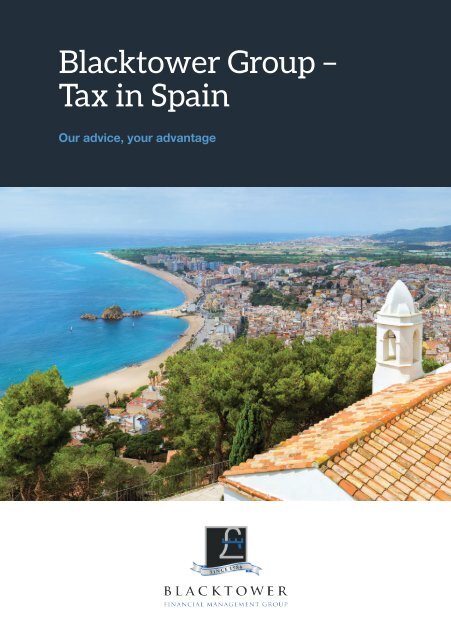Blacktower_Spain_Tax_Guide
Blacktower tax guide
Blacktower tax guide
You also want an ePaper? Increase the reach of your titles
YUMPU automatically turns print PDFs into web optimized ePapers that Google loves.
<strong>Blacktower</strong> Group –<br />
<strong>Tax</strong> in <strong>Spain</strong><br />
Our advice, your advantage
Contents<br />
Introduction<br />
1<br />
<strong>Tax</strong> Tables<br />
Your Residency Status and <strong>Tax</strong><br />
2<br />
Spanish Residency<br />
2<br />
<strong>Tax</strong> Rates in <strong>Spain</strong><br />
19<br />
UK Residency<br />
2<br />
General Income tax<br />
19<br />
Social Security and Healthcare<br />
3<br />
Income <strong>Tax</strong> Tables<br />
20<br />
The UK/<strong>Spain</strong> Double <strong>Tax</strong> Treaty<br />
4<br />
Andalucia<br />
20<br />
Establishing <strong>Tax</strong> Efficiency<br />
4<br />
Cataluña<br />
20<br />
<strong>Tax</strong> Efficiency of Investments Depends on Residency<br />
5<br />
Comunidad Valenciana<br />
21<br />
ISAs<br />
5<br />
Islas Baleares<br />
21<br />
Offshore Bank Interest<br />
6<br />
Islas Canarias<br />
22<br />
The Common Reporting Standard<br />
6<br />
Murcia<br />
22<br />
Rental Income from UK Property<br />
7<br />
Savings Income<br />
23<br />
Rental Income from Property in <strong>Spain</strong><br />
7<br />
<strong>Tax</strong> rates on income from savings 2018<br />
23<br />
<strong>Spain</strong>’s Property Wealth <strong>Tax</strong><br />
8<br />
Wealth <strong>Tax</strong> Rates and Allowances<br />
23<br />
Capital Gains on Property<br />
8<br />
Allowances<br />
23<br />
Undeclared Income or ‘Black Money’<br />
9<br />
State Wealth <strong>Tax</strong> Rates<br />
24<br />
Succession Laws<br />
10<br />
Andalucia Wealth <strong>Tax</strong> Rates<br />
24<br />
Wills and Probate<br />
10<br />
Cataluña Wealth <strong>Tax</strong> Rates<br />
24<br />
Inheritance <strong>Tax</strong><br />
11<br />
Comunidad Valenciana Wealth <strong>Tax</strong> Rates<br />
25<br />
<strong>Tax</strong> Obligations of Beneficiaries<br />
12<br />
Islas Baleares Wealth <strong>Tax</strong> Rates<br />
25<br />
Regional Differences<br />
12<br />
Islas Canarias Wealth <strong>Tax</strong> Rates<br />
25<br />
Inheritance <strong>Tax</strong> for UK Domiciles with Strong Links to <strong>Spain</strong><br />
12<br />
Murcia Wealth <strong>Tax</strong> Rates<br />
25<br />
Unmarried Couples, Step-Families and Succession Law<br />
13<br />
Succession and Gift <strong>Tax</strong> Rates and Allowances<br />
26<br />
Civil Partners and Same-Sex Marriage<br />
13<br />
Categories<br />
26<br />
Modelo 720<br />
14<br />
Relatives’ Reductions<br />
26<br />
Wealth <strong>Tax</strong><br />
16<br />
Succession and Gift <strong>Tax</strong> Rates<br />
27<br />
Conclusion<br />
18<br />
Succession and Gift <strong>Tax</strong> Multipliers<br />
27
Introduction<br />
<strong>Spain</strong> is one of the most popular destinations for British expatriates. Having made the<br />
decision to move to <strong>Spain</strong>, it is essential that you plan prudently in order to optimise<br />
your finances, particularly in relation to the implications of income and capital gains/<br />
savings taxes as well as wealth tax, rental tax, succession tax and gift tax, for example.<br />
<strong>Tax</strong> laws in the UK and <strong>Spain</strong> differ significantly and if you are going to manage your<br />
wealth successfully, the support and guidance of a professional who understands<br />
all the relevant cross-jurisdictional issues will be an invaluable asset. As a simple<br />
example, which will be discussed later in this document, winnings and growth from all<br />
the common UK tax efficient savings vehicles such as premium bonds and ISAs are<br />
taxable in <strong>Spain</strong>.<br />
The contents of this <strong>Tax</strong> <strong>Guide</strong> are believed to be correct at the date of publication.<br />
Every care has been taken that the information in this <strong>Guide</strong> is accurate at the time<br />
of release. However, all information and tax figures are subject to change and you<br />
should always make enquiries, check details and, where necessary, seek legal advice<br />
before entering into any transaction. The information is for guidance only and does<br />
not constitute advice. You should seek professional tax advice tailored to your needs<br />
and circumstances before making any decision.<br />
The <strong>Blacktower</strong> Group <strong>Tax</strong> <strong>Guide</strong> in <strong>Spain</strong><br />
1
Qualifying ties include:<br />
Your Residency Status and <strong>Tax</strong><br />
<strong>Tax</strong> residency status determines which country’s tax laws are used to tax your<br />
worldwide income and gains.<br />
• having ‘substantive’ work in the UK<br />
• having family in the UK<br />
• having housing or accommodation in the UK<br />
• spending more time in the UK than any other country, together with at least<br />
91 days in the UK over the previous two years.<br />
Spanish Residency<br />
<strong>Spain</strong> does not allow split year treatment for tax status. You are considered tax<br />
resident, if you are resident in the country for more than 183 days during the year<br />
(January to December) or if your major sources of income or economic activity occur<br />
in the country.<br />
Family ties may also determine your status – for example, if your spouse or<br />
dependent children live in the country.<br />
UK Residency<br />
It is important that you seek advice regarding how any of the above circumstances<br />
affect your residency status.<br />
Social Security and Healthcare<br />
If you are working, you should make sure you are paying social security to the correct<br />
country. It is important to note that it may not always be prudent to pay this in the<br />
same country in which the work is actually performed. Any failure in this regard can<br />
affect your ability to receive state pensions, state healthcare and other benefits.<br />
Furthermore, you may incur penalties if you do not follow the rules and consequently<br />
fail to meet your obligations.<br />
In terms of UK tax residency, your status is determined under the UK Statutory<br />
Residence Test.<br />
There are several possible statuses under this test:<br />
• Automatic overseas resident<br />
• Automatic UK resident<br />
• Sufficient ties<br />
In the event that you do not meet the respective criteria for either of the automatic<br />
residence tests, the third test assesses your residency status based on the number of<br />
days you are resident in the UK together with an assessment of your ‘ties’ to the UK.<br />
2 The <strong>Blacktower</strong> Group<br />
<strong>Tax</strong> <strong>Guide</strong> in <strong>Spain</strong><br />
3
The UK/<strong>Spain</strong> Double<br />
<strong>Tax</strong> Treaty<br />
The terms of the UK/<strong>Spain</strong> Double <strong>Tax</strong> Treaty<br />
mean it is only possible to be tax resident in one<br />
of the two countries at any given time. The treaty<br />
includes rules to help you establish your tax<br />
residency. However, as your circumstances may<br />
change it is important that you take regular advice<br />
to ensure your circumstances continue to align<br />
with the rules necessary for your status. Any oversights in this regard could prove costly.<br />
Establishing <strong>Tax</strong> Efficiency<br />
Although the UK/<strong>Spain</strong> Double <strong>Tax</strong> Treaty prevents income from being taxed in both<br />
countries, in some cases it may be possible to pay tax in the wrong country and to<br />
consequently pay more than you need to.<br />
Many expatriates in <strong>Spain</strong> mistakenly continue to pay tax in the UK, particularly if their<br />
main source of income is derived from UK pensions, UK savings or other UK-based<br />
assets. Taking early-stage advice can help expats establish tax-efficient arrangements<br />
that reduce tax liability and consequently increase cash flow.<br />
Any failure to declare income to the Spanish authorities can result in penalties and/or<br />
prosecution for tax evasion. Paying tax in the UK is no defence in these circumstances.<br />
<strong>Tax</strong> Efficiency of<br />
Investments Depends<br />
on Residency<br />
What is tax efficient in the UK may not be tax efficient in <strong>Spain</strong>, and vice-versa. For<br />
example both premium bond winnings and Individual Savings Accounts (ISAs) are<br />
tax-free in the UK. However, they may attract considerable tax liability in <strong>Spain</strong>, so<br />
it is likely you may want to restructure any investments of this type before you begin<br />
residency in the country.<br />
Furthermore, you may wish to consider the tax efficiency of the following investments<br />
when moving from the UK to <strong>Spain</strong>:<br />
ISAs<br />
• Personal Equity Plans (PEPs) – attract capital gains tax on disposal<br />
• Investment Bonds – Spanish law does not provide for the same beneficial<br />
tax-deferred allowance as in the UK<br />
• Open Ended Investment Companies (OEICs)<br />
• Investment Bonds<br />
• UK shares – Dividends are taxable in <strong>Spain</strong> whether the income is received<br />
or reinvested<br />
Although it is possible to hold on to an ISA once you have left the UK for <strong>Spain</strong>, you<br />
will be unable to make any further contributions to the account.<br />
And although it is possible to offset tax paid in one country against tax due in the<br />
other, this does not always prove advantageous. It is better to avoid the higher liability<br />
in the first place. Finding the arrangement that is most suitable for the individual is<br />
rarely straightforward, so it is important to take advice regarding the most tax-efficient<br />
arrangement for your circumstances.<br />
Furthermore, all income and gains derived from an ISA are liable for tax in <strong>Spain</strong>. If<br />
you are becoming, or are already, resident in <strong>Spain</strong>, you should consider the myriad<br />
alternative investments available as they are likely to prove more beneficial than an ISA.<br />
4 The <strong>Blacktower</strong> Group<br />
<strong>Tax</strong> <strong>Guide</strong> in <strong>Spain</strong><br />
5
Offshore Bank Interest<br />
The worldwide bank interest income of<br />
residents in <strong>Spain</strong> is subject to a tax rate of<br />
between 19% and 23% in <strong>Spain</strong>, regardless<br />
of where in the world the account is situated<br />
and whether it is used to make withdrawals<br />
etc. Furthermore, this rate is subject to limits<br />
imposed by the UK/<strong>Spain</strong> Double <strong>Tax</strong> Treaty.<br />
It is worth speaking with your adviser about the possibility of adding any such interest<br />
to your other income and to tax it accordingly.<br />
The Common Reporting Standard<br />
You should declare all your assets and accounts. <strong>Spain</strong> is signatory to the Common<br />
Reporting Standard, under which almost 100 jurisdictions automatically exchange tax<br />
and financial information on a global level. Failure to declare could result in significant<br />
fines and penalties.<br />
Rental Income<br />
Rental Income from UK Property<br />
There are more than 1.75 million landlords in the UK and many of these are expats<br />
who have multiple properties in the UK. Often these serve as a kind of proxy pension<br />
fund. Others may have one or more UK properties which they no longer live in, but do<br />
not wish to sell because of personal or familial attachments.<br />
Rental income from UK properties remains taxable in the UK regardless of residency<br />
status and must be appropriately reported in both the UK and <strong>Spain</strong>. For residents in<br />
<strong>Spain</strong>, UK rental income is also taxable in <strong>Spain</strong>, where it is added to all other income<br />
and taxed at the scale rates of tax. However, tax paid in the UK can be offset against<br />
the Spanish tax on the same income.<br />
Residents of <strong>Spain</strong> with long-term rental agreements are entitled to a 60% reduction<br />
against net rental income; this includes both rental properties owned inside and<br />
outside the country. Furthermore, some expenses are deductible.<br />
Rental Income from Property in <strong>Spain</strong><br />
Renting out Spanish property is a common investment for many expats in <strong>Spain</strong>.<br />
Owning Spanish property can help you feel connected to the country, provides realestate<br />
security, and can also provide an invaluable cash flow.<br />
However, all rental income derived from property owned in <strong>Spain</strong> is subject to tax. For<br />
non-residents of <strong>Spain</strong> living within the EU or EEA, this income attracts a flat rate tax<br />
of 19% (although mortgage interest, agency fees, repairs, and some other expenses<br />
are tax deductible). Residents from outside the EU or EEA are subject to a higher flatrate<br />
tax of 24% with no allowable deductions.<br />
6 The <strong>Blacktower</strong> Group<br />
<strong>Tax</strong> <strong>Guide</strong> in <strong>Spain</strong><br />
7
<strong>Spain</strong>’s Property Wealth <strong>Tax</strong><br />
It is worth bearing in mind that you will also be liable for UK capital gains tax for<br />
gains accrued after 6 April 2015, even if you are resident in <strong>Spain</strong>. Unless you have<br />
particular reasons for owning UK property while residing in <strong>Spain</strong> it may be worth<br />
consulting your adviser about the potential benefits of alternative investments.<br />
Any Spanish properties that are not being<br />
lived in and are not being rented out are<br />
subject to a separate tax. This is calculated<br />
on the notion that you receive annual income<br />
1.1% of the state-sanctioned valuation of the<br />
property if the property has been valued within<br />
the past decade, or at 2% if no valuation has<br />
occurred during the preceding ten years.<br />
Undeclared Income or ‘Black Money’<br />
Not that long ago in <strong>Spain</strong> many property transactions were borderline in their<br />
legitimacy as neither vendor nor buyer always disclosed the full value of the transaction.<br />
Not only is this practice of under-declaring the purchase price illegal, it can also result<br />
in a much larger capital gains liability than would otherwise apply when the property is<br />
sold further down the line. Such ‘black money’ transactions should be avoided.<br />
This income is known as ‘imputación de rentas inmobiliarias’ and is assumed by the<br />
state regardless of whether you actually receive it or not; as such it is deemed to be<br />
taxable. For residents and non-residents who live in the EU or EEA it is taxed at a flat<br />
rate of 19%. A higher rate of 24% applies to residents outside of the EU and EEA.<br />
Overseas properties owned by residents in <strong>Spain</strong> attract a similar tax on the notional<br />
income. However, the assumed income is calculated as 1.1% of 50% of the purchase price.<br />
This is then subject to a 19% or 24% tax depending on whether you live within the EU/EEA.<br />
Capital Gains on Property<br />
You are likely to be exempt from capital gains tax on the proceeds from a sale of your<br />
main Spanish residence provided you are over 65 and have lived in the property for<br />
at least three years. Similarly, you will be exempt if you are under 65 and reinvest the<br />
entire sum in a new residence.<br />
The UK/<strong>Spain</strong> Double <strong>Tax</strong> Treaty dictates that any gains realised from the disposal of<br />
UK properties attracts Spanish capital gains tax of up to 23%. This is true regardless<br />
of whether the property was your main residence, although you may still qualify for<br />
the exemptions outlined above.<br />
8 The <strong>Blacktower</strong> Group<br />
<strong>Tax</strong> <strong>Guide</strong> in <strong>Spain</strong><br />
9
Inheritance <strong>Tax</strong><br />
Succession Laws<br />
In August 2015 <strong>Spain</strong> implemented an EU<br />
regulation known as ‘Brussels IV’. Under the<br />
terms of Brussels IV, if you reside in <strong>Spain</strong><br />
you can choose to have UK succession<br />
law apply to your estate, otherwise Spanish<br />
succession law will apply automatically upon<br />
your death, including if you die intestate<br />
(without a Will).<br />
Both lifetime gifts and bequeathed assets are liable for Spanish succession and gift<br />
tax. This is true for all assets situated in <strong>Spain</strong> regardless of who the asset/gift has<br />
been given to (including spouses) and applies regardless of the recipient’s country of<br />
residence.<br />
As such all of the following assets in <strong>Spain</strong> attract this tax:<br />
• Property<br />
• Cash<br />
• Stocks<br />
• Valuable items such as paintings or antiques<br />
There may be significant advantages to electing UK succession law: <strong>Spain</strong>’s forced<br />
heirship rules do not allow you to choose certain beneficiaries – for example stepchildren<br />
– while simultaneously forcing you to hand on as much as half of your estate<br />
to your ‘bloodline’ – this includes children (biological and adopted), spouse, parents<br />
and grandparents, regardless of whether you want this.<br />
You should be aware that if you are a resident in <strong>Spain</strong>, the country’s succession law<br />
will apply to all your worldwide assets (excluding non-Spanish real estate). As such,<br />
careful planning in relation to succession laws and inheritance taxes is essential.<br />
Wills and Probate<br />
UK Wills are valid in <strong>Spain</strong> but can be complicated by the cross-jurisdictional probate<br />
process – the Will needs to be translated and notarised before it will be ready for<br />
the Spanish probate process. It can be a laborious and time-consuming process<br />
negotiating cross-border probate before assets can be distributed.<br />
It is important to be careful and to take advice. Writing a Spanish Will, even if it is just<br />
for your Spanish assets, can potentially invalidate your UK Will and in some cases<br />
may even lead to disputes between your heirs.<br />
10 The <strong>Blacktower</strong> Group<br />
<strong>Tax</strong> <strong>Guide</strong> in <strong>Spain</strong><br />
11
<strong>Tax</strong> Obligations of Beneficiaries<br />
for inheritance tax in both <strong>Spain</strong> and the UK. However, although there is no double<br />
tax treaty between the two countries relating to inheritance tax, the two countries<br />
will provide unilateral relief to prevent double taxation. In most cases, those in this<br />
situation will have to pay tax on the higher liability.<br />
In the UK, inheritance tax is paid by the estate. In <strong>Spain</strong>, succession and gift tax is<br />
paid by the beneficiaries. However, just as in the UK, the tax must be paid before the<br />
assets can be released. This can make matters complicated, particularly as in most<br />
cases the tax must be paid within six months of the testator’s death.<br />
The applicable rate of tax is calculated according to the following criteria:<br />
• The relationship between testator (donor) and beneficiary (donee).<br />
• The value of what is being passed on.<br />
• The pre-inheritance wealth of the beneficiary.<br />
• The respective residence status of the testator and beneficiary.<br />
Regional Differences<br />
Rates of tax and exemption thresholds may vary in <strong>Spain</strong> depending on the rules of<br />
the applicable autonomous region you are residing in. However, sometimes the state<br />
rules may apply and working out which takes precedence can be complicated for the<br />
uninitiated.<br />
National tax exemption thresholds are €16,000 for spouses, parents or children<br />
older than 21 – further reductions are available against the value of the main home,<br />
although their complicated nature means it is best to take advice in this regard.<br />
On occasion, tax may be due in both <strong>Spain</strong> and the UK but for different events. In<br />
such situations it is not possible to offset the tax from one country against the tax<br />
due in the other. Good advice and prudent planning are likely to prove invaluable in<br />
helping you pass on your estate in line with your wishes and with only the minimum<br />
level of tax.<br />
Unmarried Couples, Step-Families and Succession Law<br />
Spanish succession laws mean that any person who is considered a ‘desconocido’<br />
(stranger – not married to the deceased or related through marriage) could be liable<br />
for a succession or gift tax of up to 82% on the value of any gifted or inherited asset.<br />
However, this level is rarely applied. Unmarried couples, step-children and other non<br />
bloodline families should be prepared and it is wise to plan carefully in order to reduce<br />
tax liability as much as possible.<br />
Civil Partners and Same-Sex Marriages<br />
<strong>Spain</strong> recognises same sex marriages performed in other countries and allows<br />
same sex marriage within its own law. However, UK civil partners are not recognised<br />
as ‘married’ for tax and other purposes. To receive marriage legal rights in <strong>Spain</strong>,<br />
including tax benefits, you should therefore seek to convert your civil partnership into<br />
a UK civil marriage.<br />
It is important to note that although some autonomous regions have more favourable<br />
rates in place than others, overall there is not a great deal of variance in approach.<br />
Inheritance <strong>Tax</strong> for UK Domiciles with Strong Links to <strong>Spain</strong><br />
UK domiciles are subject to UK inheritance tax on death even if they have previously<br />
lived for extended periods in <strong>Spain</strong>. In theory, this can result in estates being liable<br />
12 The <strong>Blacktower</strong> Group<br />
<strong>Tax</strong> <strong>Guide</strong> in <strong>Spain</strong><br />
13
Modelo 720<br />
All residents of <strong>Spain</strong> are required by law to declare all assets they hold outside <strong>Spain</strong><br />
worth more than €50,000 (per asset class), regardless of the holder’s nationality. The<br />
reporting form for these assets is known as Modelo 720.<br />
Modelo 720 divides assets into three groups:<br />
• Overseas property<br />
• Cash, deposits, ISAs – held in overseas financial entities<br />
• Financial assets (bonds, investments, pensions, insurances) located abroad<br />
The Spanish tax agency (Agencia Tributaria) issue severe fines for any nondisclosure<br />
of assets – in some cases these can be as high as 150% of the value of<br />
the undeclared assets. Furthermore, there is no limit to how far back fines may be<br />
retrospectively imposed for historical incidents of non-disclosure.<br />
Following an intervention by the European Commission, which was concerned about<br />
the seemingly punitive nature of these fines, the Spanish <strong>Tax</strong> Authorities no longer<br />
impose the penalty of 150% of the value of the undeclared assets in the event that<br />
there is voluntary (even if late) declaration of the Modelo 720. Previous to this, even<br />
small errors made in good faith could receive stern punishment.<br />
Any person who has assets exceeding a value of €50,000 at 31 December (the<br />
official reporting date) is required to submit a report. Modelo 720 reporting is only<br />
required in subsequent years in the event the value of the assets reported increases<br />
by €20,000 on the previous stated value. You must also report any event involving<br />
the sale or closure of an asset previously reported on the form.<br />
14 The <strong>Blacktower</strong> Group<br />
<strong>Tax</strong> <strong>Guide</strong> in <strong>Spain</strong><br />
15
Wealth <strong>Tax</strong><br />
Wealth tax is payable annually on the total net value of your assets at 31 December<br />
of that year. All residents of <strong>Spain</strong> who meet the threshold for this tax are liable for the<br />
total value of their worldwide assets. Non-residents are liable only for assets located<br />
in <strong>Spain</strong>. It is important to note that loans are deductible from your net taxable wealth<br />
– the exception is if they have been used to purchase or invest in assets which are<br />
exempt from wealth tax.<br />
• Intellectual property rights owned by the author/creator/artist<br />
• Business assets where income from the business make up at least 50% of<br />
the individual’s taxable income and meet certain other criteria<br />
Spanish wealth tax is effectively a tax on capital assets. There is no comparable tax in<br />
the UK and it can be very difficult to plan for without advice. Furthermore, wealth tax<br />
rates may vary depending on the autonomous region in which you or your assets are<br />
located. There are limits to Spanish wealth and income tax and this means that there<br />
are ways to limit your liability by intelligently managing your assets alongside your<br />
total income. It is best to seek advice in this regard.<br />
Although the wealth tax was introduced as an emergency measure, ostensibly to help<br />
deal with the financial crisis of 2008, there has long been expectation that it will be<br />
abolished. However, it still exists today.<br />
Wealth tax is payable on the value of most assets, including the following:<br />
• Property<br />
• Art<br />
• Jewellery<br />
• Cars<br />
• Yachts<br />
• Savings<br />
• Investments<br />
Some assets may be exempt from wealth tax. These include the following:<br />
• Some household contents<br />
(not jewellery, fur coats, boats, vehicles, art and antiques)<br />
• Certain family companies meeting certain conditions<br />
(not including most property investment companies)<br />
• Pension pots<br />
• Owner-managed small businesses<br />
16 The <strong>Blacktower</strong> Group<br />
<strong>Tax</strong> <strong>Guide</strong> in <strong>Spain</strong><br />
17
Conclusion<br />
<strong>Tax</strong> Rates in <strong>Spain</strong><br />
Professional, expert advice is critical to effectively manage your tax liability in <strong>Spain</strong>,<br />
particularly if there are possible cross-jurisdictional and language issues to consider.<br />
<strong>Spain</strong>’s taxation and succession laws differ markedly from those in the UK –<br />
sometimes this may work to your personal advantage, but at other times it may not. It<br />
is only by carrying out full analysis of your situation and with careful planning that you<br />
can feel confident of striking a balance that most closely aligns with the interests of<br />
you and your family.<br />
At <strong>Blacktower</strong>, we understand that everyone is different and it is important your<br />
adviser has an understanding of you, your circumstances, your long-term goals and<br />
your cash-flow needs. We take the time to get to know you and will answer your<br />
investing, savings and retirement planning questions so that we may provide a truly<br />
bespoke service.<br />
The contents of this <strong>Tax</strong> <strong>Guide</strong> are believed to be correct at the date of publication.<br />
Every care has been taken that the information in this <strong>Guide</strong> is accurate at the time<br />
of release. However, all information and tax figures are subject to change and you<br />
should always make enquiries, check details and, where necessary, seek legal advice<br />
before entering into any transaction. The information is for guidance only and does<br />
not constitute advice. You should seek professional tax advice tailored to your needs<br />
and circumstances before making any decision.<br />
Income tax<br />
In <strong>Spain</strong>, your taxable income (including capital gains) is split into general income<br />
and savings income.<br />
Savings income includes:<br />
• Interest on savings<br />
• Shareholder dividends<br />
• Income from annuities<br />
• Income derived from life assurance contracts<br />
• Capital gains on the sale/transfer of assets<br />
General Income, not categorised as savings-related, includes:<br />
• All earned income (i.e. salary, self-employment and pension income)<br />
• Income from rental properties<br />
• Notional rental income (imputación de rentas inmobiliarias)<br />
• Royalties<br />
• Any imputed income and gains not made on the sale/transfer of assets (for<br />
example, from lottery/gambling)<br />
General income tax<br />
Income tax rates are made up of a state tax plus a regional tax. Each autonomous<br />
community sets their own local rates.<br />
The following pages contain the 2018 tables for the regions most popular with<br />
expatriates.<br />
18 The <strong>Blacktower</strong> Group<br />
<strong>Tax</strong> <strong>Guide</strong> in <strong>Spain</strong><br />
19
Income <strong>Tax</strong> Tables<br />
Comunidad Valenciana<br />
Andalucia<br />
Islas Baleares<br />
Cataluña<br />
20 The <strong>Blacktower</strong> Group<br />
<strong>Tax</strong> <strong>Guide</strong> in <strong>Spain</strong><br />
21
Islas Canarias<br />
Savings Income<br />
<strong>Tax</strong> rates on income from savings 2018.<br />
Wealth <strong>Tax</strong> Rates and Allowances<br />
Murcia<br />
Wealth tax is payable annually on the total net value of your assets at 31 December<br />
of that year. Residents of <strong>Spain</strong> are liable for the total value of their worldwide assets.<br />
Non-residents are liable only for assets located in <strong>Spain</strong>.<br />
Allowances<br />
The above assumes a main home value in excess of €600,000 and all assets held in<br />
joint names. For lower value property, the balance of allowance cannot be offset.<br />
Autonomous regions can and do vary the allowances and rates. Wealth tax is an<br />
individual tax and joint tax returns are not permitted.<br />
Please note:<br />
The Cataluña individual deduction has fallen from €700,000 to €500,000.<br />
The Comunidad Valenciana individual deduction has fallen from €700,000 to €600,000.<br />
22 The <strong>Blacktower</strong> Group<br />
<strong>Tax</strong> <strong>Guide</strong> in <strong>Spain</strong><br />
23
State Wealth <strong>Tax</strong> Rates<br />
Comunidad Valenciana Wealth <strong>Tax</strong> Rates<br />
Andalucia Wealth <strong>Tax</strong> Rates<br />
Islas Baleares Wealth <strong>Tax</strong> Rates<br />
Cataluña Wealth <strong>Tax</strong> Rates<br />
Islas Canarias Wealth <strong>Tax</strong> Rates*<br />
*State wealth tax rates apply.<br />
Murcia Wealth <strong>Tax</strong> Rates<br />
24 The <strong>Blacktower</strong> Group<br />
<strong>Tax</strong> <strong>Guide</strong> in <strong>Spain</strong><br />
25
Succession and Gift <strong>Tax</strong> Rates and Allowances<br />
Succession and Gift <strong>Tax</strong> State Rates<br />
Rates vary across each autonomous region, and notably in Andalucía, Murcia,<br />
Comunidad Valenciana, Cataluña, Madrid, Islas Baleares and Islas Canarias.<br />
The following are national rates.<br />
Categories<br />
Relatives’ Reductions<br />
<strong>Tax</strong> liability is dependent on the relationship between donor and recipient and the preexisting<br />
wealth of the recipient – multipliers apply.<br />
Succession and Gift <strong>Tax</strong> Multipliers<br />
For region specific tax rates, please contact <strong>Blacktower</strong> directly and we will be happy<br />
to help.<br />
26 The <strong>Blacktower</strong> Group<br />
<strong>Tax</strong> <strong>Guide</strong> in <strong>Spain</strong><br />
27
Get in touch with <strong>Blacktower</strong><br />
<strong>Spain</strong> - Costa del Sol<br />
Centro Comercial Plaza, Minitienda 15, Nueva Andalucia,<br />
29660 Marbella, Málaga, <strong>Spain</strong><br />
+ 34 952 816 443<br />
<strong>Spain</strong> - Costa Blanca<br />
Avinguda d’Ausiàs March 9, Local 7 (Esquina Joan Fuster), 03730 Javea, Alicante<br />
+ 34 965 058 212<br />
<strong>Spain</strong> - Costa Cálida<br />
120 Avenida Dr. Artero Guirao 2C, San Pedro Del Pinatar, 30740, Murcia, <strong>Spain</strong><br />
+34 968 187 331<br />
<strong>Spain</strong> - Barcelona<br />
Portal del Angel, 36, 2-1, 08002 Barcelona, <strong>Spain</strong><br />
+34 935 477 363<br />
Tenerife<br />
Ctra. Gen. C-822 Nº 61, Edif J. J. Garoé, Valle San Lorenzo,<br />
Arona 38626 Tenerife, <strong>Spain</strong><br />
+ 34 822 680 037<br />
Mallorca<br />
La Rambla 13-1, 07003 Palma de Mallorca, <strong>Spain</strong><br />
+ 34 971 425 986<br />
www.blacktowerfm.com
www.blacktowerfm.com<br />
<strong>Blacktower</strong> Financial Management (International) Limited is licensed by the Gibraltar Financial Services<br />
Commission. Licence Number 00805B.<br />
<strong>Blacktower</strong> Financial Management Ltd is authorised and regulated by the Financial Conduct Authority in the UK.<br />
The registered office is Mount Manor House, 16 The Mount, Guildford, Surrey GU2 4HN. Registered in England.<br />
Registration No: 3500648.<br />
<strong>Blacktower</strong> Financial Management (International) Limited in the Grand Cayman is regulated by the Cayman Islands<br />
Monetary Authority. Licence Number 896523.<br />
<strong>Blacktower</strong> Financial Management (US) LLC is registered as an investment adviser with US Securities and<br />
Exchange Commission.<br />
1

















